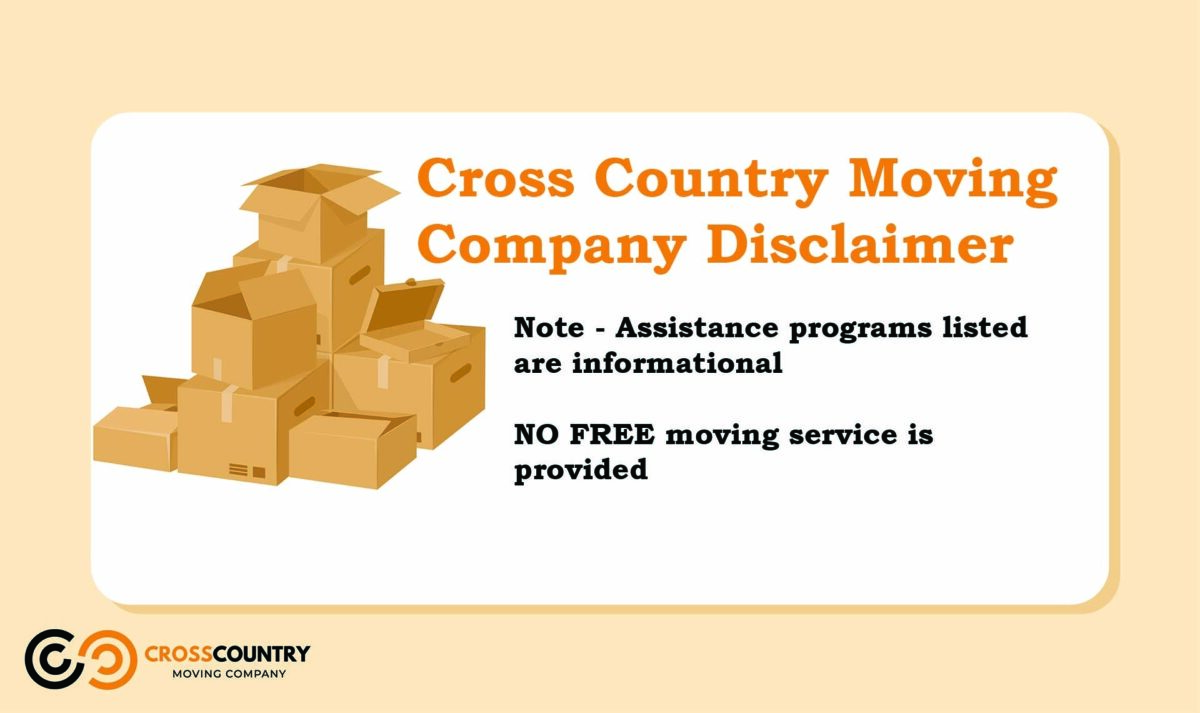These programs can help people move out of state by providing help with overall moving costs. They offer help relocating to another state alone or with family, and may vary from one location to another, but typically include housing assistance, job training, education grants, transportation subsidies, and food assistance. They cannot help you when hiring cross-country movers. However, they can help families with other expenses. So the money people saved can be used to cover the cost of long-distance moving services. With the right kind of support, they can find more stable housing and employment opportunities, as well as access to better educational and healthcare options.
List of Programs to Help You Move Out of State
If you are looking for programs to help move out of state, you will want to check out our suggestions. There are different solutions that can provide you with the assistance you need to make moving cross-country a success. These relocation pointers will allow you to overcome any financial obstacles.




How to Save Up Before Applying for Programs to Help You Move Out of State
When it comes to moving out of state, proper planning and saving money to move are essential. Before you apply for programs or resources that may help finance your move, it is important to have a plan in place. Here are some tips for saving up before making the transition:
- Make a relocation budget: Take an honest look at your finances and create a relocation budget that outlines your income and expenses. This will help you identify areas of your finances where you can cut back to save more.
- Set savings goals: Once you know how much money you need to save to make the move, set specific goals for yourself. Make sure these goals are realistic and achievable so that you can stay on track and reach them.
- Track your progress: Once you’ve set your savings goals, track your progress to see how far along you are in reaching them. This will help keep you motivated and accountable for meeting your goals.
- Cut back on unnecessary expenses: Look for ways to reduce your spending in order to free up more money for savings. Consider reducing your entertainment costs, eating out in restaurants in Seattle less, and avoiding impulse purchases.
- Take on a side job: If you need extra cash to help finance the move, take on a part-time or seasonal job. Finding a job when you plan to move will give you an additional source of income that can be put towards your move.
By following these tips, you can successfully save up and finance your move out of state. With proper planning and saving strategies in place, you’ll be able to make the most of any programs or resources that may help with your transition. You can also consider reducing any costs associated with the relocation by doing some of the packing and paying for packing services only for fragile items or for them to take care of bulky furniture. You can also consider the cheapest time of the year to move or declutter your home to donate items and sell everything else you don’t need.


Benefits of Applying for Financial Assistance
Relocating to a new state with no money and hiring cross-country movers to help you move don’t seem to align with one another. However, a government relocation assistance program is an invaluable resource for those who need additional help with their relocation expenses.
This program provides financial boosts to individuals and families in need, helping them cover the costs of services by a long-distance moving company. Whether you need to cover the cost of long-distance movers for a one-bedroom apartment or a whole house, this financial aid might be just what you need to relocate efficiently.
Affordable Housing
Households often struggle to find affordable housing, especially in areas where housing prices are high. Applying for assistance with your relocation can help make relocating more affordable and accessible.
Reduced Moving Costs
Relocations are expensive, and any federal relocation assistance program can provide a financial boost to cover some of these expenses. This could be a huge relief for those who are struggling financially and need help covering the cost of relocation.
Stress Relief
Relocating is a very stressful process, but with the assistance provided by this program, individuals can deal with their stress and focus on more important things during their transition. Knowing that there is assistance available to cover some of the costs associated with relocating can be a huge relief and allow a stress-free move.
Improved Quality of Life
Relocating to a better neighborhood or community (like one of the safest neighborhoods in Dallas) can have a positive impact on an individual or family’s quality of life. By applying for relocation assistance programs, individuals and their kids can get closer to achieving this goal.
The YWCA Offers a Range of Solutions Related to Housing
This nonprofit that prioritizes serving women and minorities provides a range of financial assistance related to housing, including transitioning services meant to assist with moving costs. Find the YWCA program that is closest to you, then get in touch to explore what services could fit your personal case.
How to Apply for This Moving Assistance
It can be of great help if you reach out to this organization to help with the costs of a cross-country moving company and its cross-country moving services. For additional information, visit YWCA.org or dial (202) 467-0801 to reach the organization’s national helpline.


Emergency Housing Fund by Housing Industry Foundation
The Emergency Home Fund of the Housing Industry Foundation (HIF) provides one-time donations of $2,500 maximum to qualified candidates who require assistance with housing relocation. Grant applications are processed swiftly (often in less than 24 hours), but they are only recognized on the basis of referrals, so start the procedure early to be sure.
Visit Their Website to Apply
To find out more about the programs that are offered and how to become an applicant for the Emergency Housing Fund, go to HIFinfo.org. Everything is stated on their website in detail.
Veterans Administration Housing Assistance for Veterans
The VA Housing Assistance plan provides financial support to individuals in dire need of relocation housing expenses, along with providing low-interest housing and refinancing mortgages. This program is available to veterans who require lomoving assistance.
Where and How to Apply
For additional information, visit VA Housing Assistance or dial (877) 4AID VET, the free, round-the-clock National Call Center for Homeless Veterans (877-424-3838).


HUD Housing and Rental Assistance
Public housing, rental aid for both government housing and privately owned apartments with reduced rent, and other services are all provided by HUD – the US Department of Housing and Urban Development through its many programs.
Voucher for Housing Choice
You may also be eligible for the HCV (Housing Choice Voucher) program, which allows you to select any type of housing that satisfies the program’s criteria, including single-family homes, townhouses, and apartments. The scheme pays the landlord the housing subsidy personally. Families that participate in the HCV housing program can utilize these vouchers to purchase a residence and receive ongoing support.
An FHA Loan
Obtaining a home loan through HUD’s FHA (Federal Housing Administration) is an additional choice. Because the loan is insured by the FHA, the lender can give you a much better bargain. Low closing costs and deposits are additional benefits. The down payment for first-time homebuyers might go down to 3.5% of the cost of the house.
Seniors who are homeowners and are 62 years of age or older can receive financial assistance through the FHA Reverse Mortgage program. It makes homeownership possible for public residents using the Public housing Residents program. Additionally, the single-family properties sold under the Good Neighbor Next Door plan that is situated in redevelopment regions receive a 50% reduction off the market price. Law enforcement personnel, educators (P-K through 12), emergency medical personnel, and firefighters, who all play a part in community regeneration, are also eligible for the program. A three-year lease on the property is required for qualified buyers.

Storage
Cross Country Moving Company is the most trusted name in auto industry in the country.

International Shipping
Cross Country Moving Company is the most trusted name in auto industry in the country.
Moving Insurance
Cross Country Moving Company is the most trusted name in the relocation industry in the country.
How to Explore the Options and Apply
Freely explore the program on the HDU website and learn more about the requirements and application procedures. You can reach HUD’s FHA Resource Center by phone at (800) CALL-FHA if you have any inquiries concerning FHA loans or initiatives (800-225-5342). Contact HUD’s Public and Indian Housing Resource Center (PIH) or dial (800) 955-2232 with any inquiries you may have regarding its rental programs. Additionally, you can call (800) 569-4287 for inquiries on all of the PIH’s programs or visit the PIH Customer Service Center.
Check the listings for your state to see if you qualify to enroll in the Good Neighbor Next Door plan, then follow the directions on the website. The listings for the property are updated each week. You also need to fulfill eligibility conditions. Your local or state government can offer HUD-related programs along with federal rental aid, homeownership help, and residence-buying support programs. Search for them by the state you’re interested in.
The following video explains how to apply for an FHA loan.
Reach Out to Your County or Local Government
If you require immediate relocation assistance and you’re relocating without a job, these are not your only choices. Many municipal and state organizations also provide assistance with the costs of cross-country moving companies. Also, some relocation companies even provide publicly funded assistance/HRA moving services for individuals who qualify.
The county government is an excellent resource for linking you with initiatives that can assist with relocation costs, even if they are unable to do so directly. Inquire about possible relocation assistance programs, bearing in mind that you might need to be explicit about what you require financial support for and how much. State which services you need and whether you expect them to cover solutions like auto shipping service. Also, ensure you reach out to any charities that help with moving expenses, too.







